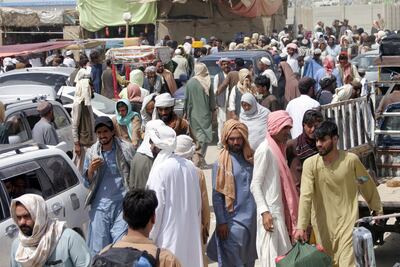Afghans seeking safe refuge from Taliban rule poured in from all corners of the country to form jostling queues at the doorstep of neighbouring Pakistan, with which Afghanistan shares its longest border.
The vast frontier between the two countries known as the Durand Line stretches for 2,670 kilometres.

Tajiks from hundreds of miles to the north of Pakistan, Hazaras from the country's central highlands and the more usual local Pashtun traders from nearby Kandahar and Spin Boldak gathered at border crossings clutching small bags of possessions.
Two weeks after the Taliban's stunning takeover of Afghanistan, and after the end of the international airlift from Kabul's beleaguered airport, the country's land borders offer the only exit.
The last US plane left Afghanistan on Monday and Taliban fighters entered Kabul's airport immediately after, firing tracer rounds into the night sky in celebration.
Traffic at the border crossing at Chaman in Pakistan has risen four-fold, officials told The National, with as many as 20,000 entering the country each day.

Pakistan said it would not allow refugees across and those coming insisted they were travelling for weddings or on family business.
"I am coming from Bamyan province, I am going to my relatives in Quetta," said Jawad Hussain, declining to comment on the Taliban takeover or how they were treating people from his Hazara ethnic group.
Afghans crossing at Chaman arrived amid reports of reprisals against their compatriots who might have worked for the government or its foreign backers, as well as a looming economic and humanitarian crisis.
Muhammad Usman, a resident of the eastern city of Jalalabad, would only say there was “uncertainty” in Afghanistan and he had decided to leave.
Pakistan's politicians fear that the country will again experience a large influx of refugees, as it did in the 1980s and 1990s.
“Pakistan has been hosting about 3.5 million Afghan refugees for years and years now. At the height of the war in that country, we had 5 million refugees,” Information Minister Fawad Chaudhry told reporters at the weekend.
“The conflict in Afghanistan actually scares us ... one major reason is that we don't want more people from Afghanistan here in Pakistan. Our economy is not that strong."
Hundreds of kilometres to the north-west of Chaman, the border at Torkham is closed.
The turbaned Taliban border guards exchange friendly chat with the Pakistani officials on the other side, but the wire gates between them remain firmly closed to Afghans who might flee. There are no crowds to be seen and the Taliban guards are keeping people well back from the frontier.
Qaiser Khan Afridi, spokesman for the United Nations refugee agency, said about 550,000 Afghans had left their homes so far this year, but that internal displacement had not yet turned into a rush to cross into the country's neighbours.
“The Afghanistan crisis remains overwhelmingly within Afghanistan itself. We haven’t seen any large-scale movement of those Afghans wanting to seek asylum in Pakistan. We are closely observing the trends as the situation in Afghanistan remains fluid and uncertain.”
At Chaman, there is a two-way flow across the border. While more are leaving, there are still significant numbers returning to Afghanistan, officials said.
Abdul Salam, a 27-year-old religious student, for one, said he was returning to Afghanistan to live under the new Taliban government.
“The Islamic emirate is established, I am going back to my country. I am excited to see the return of Sharia law in my country,” he said.
Pakistan has been accused by the US of supporting the Afghan Taliban, as it was one of the few countries to recognise the Taliban government that was taken down by the western alliance war with Afghanistan after the 9/11 attacks on New York and Washington in 2001.
Islamabad hasn't yet announced its position towards the change of the political balance in its troubled neighbour nor established any direct contacts with Taliban.

